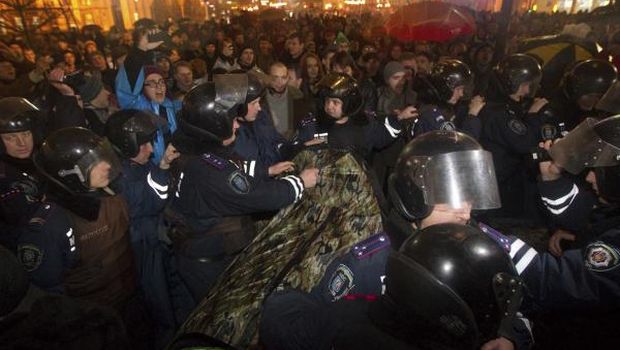
Riot police try to stop activists of Ukrainian opposition parties during a rally in support of euro integration in central Kiev on November 22, 2013. (REUTERS/Valentyn Ogirenko)
The famine was engineered by Soviet dictator Josef Stalin in 1932–1933, in an attempt to force peasants to join collective farms.
Ukraine’s parliament has labeled the famine, known here as Holodomor—or death by hunger—as genocide.
Meanwhile, over 1,000 activists protested on Kiev’s main square, days after the government froze plans to sign the EU deal after pressure from Moscow. A larger rally is planned for Sunday.
After months of promising to sign a long-awaited political and trade accord with the EU, the government announced Thursday that it was halting those plans and would focus on restoring ties with Russian instead.
The move has been deemed a victory for Moscow, which has used threats and sanctions to keep Ukraine in its orbit.
Angry demonstrators gathered across the country to denounce President Viktor Yanukovych’s turnaround, urging him to change his mind and sign the deal at a summit in Vilnius, Lithuania, scheduled for next week.
An opinion poll conducted in October found that 45 percent of Ukrainians favor stronger ties with the EU, 14 percent favored an economic alliance with Russia, while the rest were either against any alliances or were undecided. The GFK Ukraine polling agency, that conducted the research, said the poll questioned 1,000 people and its margin of error was 3 percentage points.
“We will show the authorities that they cannot ignore the choice of the majority of people,” said Vitaly Klitschko, an opposition leader and former world heavyweight boxing champion.
Klitschko urged Ukrainians to turn out for the Sunday rally. “We will show them that together we are a force that can win.”
